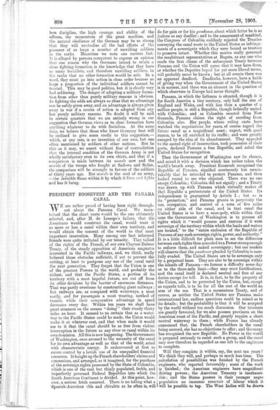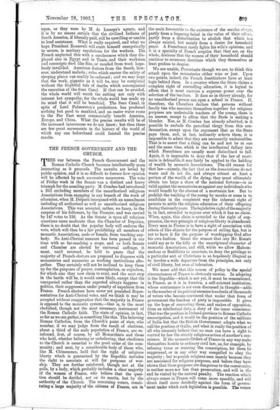PRESIDENT ROOSEVELT AND THE PANAMA CANAL.
WE are rather proud of having been right through- out about the Panama Canal. We main- tained that the short route would be the one ultimately selected, and, after M. de Lesseps's failure, that the Americans would construct the canal, would treat it as more or less a canal within their own territory, and would obtain the consent of the world to that most important innovation. Many among our best informed friends were quite irritated by our tenacity. They talked of the rights of the French, of our own Clayton-Bulwer Treaty, of the steady opposition of American magnates interested in the Pacific railways, and, we think, really believed those obstacles sufficient, if not to prevent the cutting, at least to postpone any use of the canal until the next. generation. They forgot that the Union is one of the greatest Powers in the world, and probably the richest, and that the Pacific States, a portion of its territory with a most hopeful future, are cut off from its other divisions by the barrier of enormous distances. That was partly overcome by constructing giant railways ; but railways are, as compared with waterways, a most 'costly, and for passengers a most wearing, method of transit, while their comparative advantage in speed decreases every day. Within ten years we shall have great steamers on the oceans " doing " their steady thirty miles an hour. It seemed to us certain that as a water- way to the Pacific States could be made, the Union would make it at whkatever cost, and that when made it would see to it that the canal should be as free from violent interruption in the future as any river or canal within its own dominion. All this is now happening. The Government of Washington, once aroused to the necessity of the canal for its own advantage as well as that of the world, acted with characteristic energy. It endeavoured at first to secure control by a lavish use of its unequalled financial resources. It bought up the French shareholders' claims and concessions, and arranged, as it imagined, for the purchase of the sovereign rights possessed by the State of Colombia, which is one of the vast but thinly populated, feeble, and imperfectly governed Federal Republics into which the South American Continent is divided. At this point, how- ever, a serious hitch occurred. There is no telling what a 'Spanish-American able and chivalric as he often is, will do for gain or for his punclon,or, about which latter he is as jealous as any duellist; and to the amazement of mankind, the Congress of Colombia suddenly rejected the Treaties conveying the canal route to the United States as infringe- ments of a sovereignty which they were bound as trustees to preserve intact. Whether this motive really governed the recalcitrant representatives at Bogota, as any one who reads the first clause of the subsequent Treaty between Panama and the Union will agree that it may have done, or whether the Deputies hoped for yet more liberal terms, will probably never be known ; but at all events there was an apparent deadlock. Deadlocks, however, have a habit of giving way when the Government of the United States is in earnest, and there was an element in the question of which observers in Europe had never thought.
Panama, in which the Isthmus is situated, though it is for South America a tiny; territory, only half the size of England and Wales, and with less than a quarter of a million people, is still a Republic, though federally united with Colombia ; and as Colombia seceded from New Granada, Panama claims the right of seceding from Colombia also. Her people, whose ruling caste have watched the negotiations for years, of course regard the future canal as a magnificent asset ; expect, with good reason, to be all enriched by its traffic ; and were greatly enraged by the idea of its abandonment. They appealed to the sacred right of insurrection, took possession of their ports, declared Panama a free Republic, and asked the United States for recognition.
Then the Government of Washington saw its chance, and seized it with a decision which has rather taken the world's breath away. President Roosevelt recognised the Republic of Panama, signified courteously but unmis- takably that he intended to protect Panama, and then looked round to see who objected. There was no one except Colombia ; Colombia did not signify ; and a Treaty was drawn up with Panama which virtually makes of that Republic a protectorate of the United States. Its independence is guaranteed by Article I.; but so is its "protection," and Panama grants in perpetuity the use, occupation, and control of a zone of fire miles on either side of the canal, and in that canal the United States is to have a monopoly, while within that zone the Government of Washington is to possess all rights which it "would possess and exercise if it were sovereign of the territory within which the lands and waters are located," to the "entire exclusion of the Republic of Panama of any such sovereign rights, power, and authority." It is a little difficult for plain men to see the difference between such rights thus conceded to a Power strong enough to enforce them, and naked sovereignty; but our readers will observe that the pundonor pleaded by Colombia is care- fully evaded. The United States are to be sovereign only by a perpetual lease. They are also to be sovereign within the islands off Panama—we foresee a difficulty some day as to the three-mile limit—they may erect fortifications, and the canal itself is declared neutral and free of any duties except for toll. It is, in fact, to be the property of the Union, and to be protected by the Union, but, except as regards tolls, is to be for all the rest of the world an arm of the sea. That is a momentous Treaty, and of course, as neither the United States nor Panama make international law, endless questions could be raised as to its details ; but the probability is that it will be accepted by the world without too much discussion. Our interests are greatly favoured, for we also possess provinces on the American coast of the Pacific, and greatly require a short neutral waterway to them ; while France has already announced that, the French shareholders in the canal being secured, she has no objections to offer ; and Germany has recognised the new Republic. No Power in the world is prepared seriously to resist such a group, and the canal may now therefore be regarded as one left to the engineers to complete.
Will they complete it within, say, the next ten years ? We think they will, and perhaps in much less time. The scalculation of possibilities was finished by the French engineers, who reported favourably ; some of the work is finished ; the American engineers have magnificent driving powers ; the American Treasury is inexhaust- ible; and the States possess in their younger negro population an immense reservoir of labour which it 'will be possible to tap. The West Indies will be drawn upon, as they were by M. de Lesseps's agents, and it is by no means certain that the civilised Indians of South America, if liberally paid, will be unwilling or unable to lend assistance. What is really required, and what we hope President Roosevelt will exert himself energetically to secure, is sanitary regulations for the workers. The French neglected this with a carelessness which they dis- played also in Egypt and in Tunis, and their workmen and conscripts died like flies, or receded from work hope- lessly invalided. American doctors from the South, how- ever, understand malaria ; rules which ensure the safety of sleeping places can readily be enforced; and we may hope that the work, gigantic as it will be, may be completed without the frightful tale of deaths which accompanied the execution of the Suez Canal. If that can be avoided, the whole world will watch the cutting not only with interest but sympathy, for the whole world has made up its mind that it will be beneficial. The Suez Canal, in spite of Lord Palmerston's predictions, has produced nothing but good to mankind, and an easier water route to the Far East must commercially benefit America, Europe, and China. What the precise results will be of the increased intercourse we do not know ; but then there are few great movements in the history of the world of which any one beforehand could foretell the precise results.



















































 Previous page
Previous page